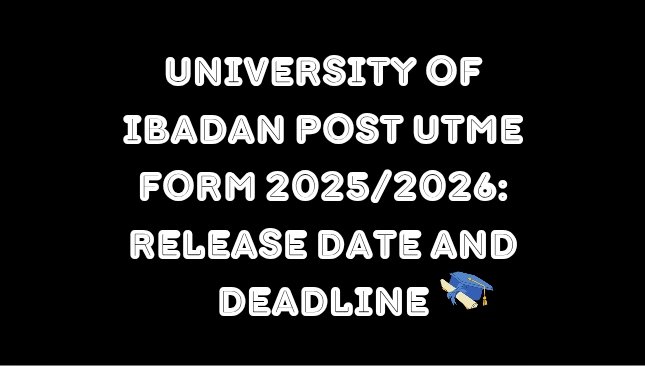Let’s be honest, getting into Olabisi Onabanjo University (OOU) is never easy. Every year, thousands of intelligent students sit for the Post UTME, but only a percentage of that number make it into the courses they desire. And here’s the truth which might sound cold: the difference between those who pass and those who fail does not always depend on “brains”, it’s preparation.
The OOU Post UTME Syllabus For 2025 is not just something that is nice to have, it’s your GPS to success. It shows you exactly where to focus on, what to ignore, and how to prepare very well. In this guide, we’ll break down the reason why using this syllabus will change the game for you, how to use it well, and how it can put you ahead of thousands of other aspirants.
OOU Post UTME Syllabus For 2025: Area of Concentration for All Subjects
Below is breakdown of the major topics you should expect on each subjects. These are drawn from the 2025 syllabus guidelines, OOU’s past Post UTME patterns, and the most commonly repeated question areas.
1. English Language (Compulsory for All Candidates)
This is one of the subjects that is feared in Post UTME, not because it’s “hard” but because it’s deceptively easy to lose marks here if you ignore the details.
Main Areas of Concentration:
Comprehension Passages
Lexis and Structure – Synonyms, antonyms, idiomatic expressions, phrasal verbs.
Sentence Correction – Grammar, punctuation, tense agreement.
Word Forms – Noun, verb, adjective, and adverb forms of the same word.
Cloze Test – Fill-in-the-blanks using contextual clues.
Summary Writing Skills – Ability to identify main points concisely.
2. Mathematics (For Science, Engineering, and Certain Management Courses)
Here’s the thing about Post UTME Maths at OOU, they test application more than memorization.
Main Areas of Concentration:
Algebra – Indices, logarithms, quadratic equations, inequalities.
Geometry and Mensuration – Area, volume, perimeters, angles in polygons.
Statistics – Mean, median, mode, probability.
Trigonometry – Sine, cosine, tangent, height/distance problems.
Number Bases and Modular Arithmetic – Convert between bases, basic mod calculations.
Simultaneous Equations – Linear and quadratic forms.
3. Biology (For Medicine, Pharmacy, Agriculture, and Life Sciences)
Biology questions in OOU’s Post UTME tend to go deeper than WAEC level, they do like details.
Cell Biology – Structure, functions, organelles.
Genetics & Heredity – Mendelian laws, crosses, mutations.
Ecology – Food chains, nutrient cycles, conservation.
Reproductive Systems – In plants and animals.
Human Anatomy & Physiology – Circulatory, respiratory, digestive systems.
Classification of Living Things – Binomial nomenclature, kingdoms, phyla.
4. Chemistry (For Sciences, Pharmacy, Engineering)
OOU Chemistry questions love testing your ability to apply concepts rather than just recall them.
Main Areas of Concentration:
Atomic Structure – Electron configuration, periodic trends.
Chemical Bonding – Ionic, covalent, metallic.
Stoichiometry – Mole concept, empirical/molecular formulae.
Acids, Bases, and Salts – pH calculations, neutralization, titration.
Organic Chemistry – Hydrocarbons, functional groups, simple reactions.
Thermochemistry – Heat of reaction, enthalpy changes.
5. Physics (For Sciences, Engineering, Tech-related Courses)
Main Areas of Concentration:
Mechanics – Motion, Newton’s laws, work, energy, power.
Waves and Sound – Wave properties, reflection, refraction, Doppler effect.
Electricity & Magnetism – Ohm’s law, circuits, electromagnetic induction.
Heat & Thermodynamics – Temperature changes, expansion, laws of thermodynamics.
Optics – Lenses, mirrors, image formation.
Modern Physics – Radioactivity, nuclear energy basics.
6. Economics (For Social Sciences, Management Sciences)
OOU loves testing candidates on basic definitions and applied concepts in Economics.
Main Areas of Concentration:
Microeconomics – Demand, supply, elasticity.
Macroeconomics – Inflation, unemployment, GDP.
Public Finance – Taxation, government expenditure.
Money and Banking – Functions of money, central bank roles.
International Trade – Balance of payments, trade barriers.
Economic Development – Indicators, problems of developing nations.
7. Government (For Law, Political Science, Public Administration)
Government is one subject where OOU loves historical accuracy.
Main Areas of Concentration:
Constitutional Development in Nigeria – 1922, 1946, 1951, 1960, 1979, 1999 constitutions.
Political Systems – Democracy, federalism, unitary system.
Organs of Government – Executive, legislature, judiciary.
International Relations – UN, AU, ECOWAS.
Political Ideologies – Capitalism, socialism, communism.
Current Affairs – Major political events in Nigeria and globally.
8. Literature in English (For Arts and Law)
Literature questions are both direct and interpretative.
Main Areas of Concentration:
Drama – Elements, types, plays studied in WAEC.
Prose – Narrative techniques, characterization, themes.
Poetry – Poetic devices, tone, themes.
General Literary Appreciation – Figures of speech, literary terms.
Related Articles
UNIPORT Post UTME Syllabus 2025
UNN Post UTME Syllabus 2025: Area of Concentration for Aspirants
Benefits of Using the OOU Post UTME Syllabus For 2025
Getting ready for Post UTME without the syllabus is like traveling to a place but you do not know the road. This is why the OOU Post UTME Syllabus For 2025 is your way to pass your exam:
1. Laser-Focused Study
Instead of you wasting time to read every single topic from the JAMB syllabus that is very big, you willl know the main areas OOU always set. This means you can study smarter and not longer.
2. Higher Retention Rate
When you cram topics that are relevant, your brain will help you remember more of what really matters because that is what you focus on.
3. Reduced Exam Anxiety
Nothing kills confidence in exam like sitting down and seeing strange questions. The syllabus is what makes sure that you already met those topics before, as it reduces panic and boosts your self-assurance.
4. More Practice on Relevant Questions
The syllabus will tell you the scope. This means that you can make your past question practice to match exactly what OOU tests, as this will make your mock sessions very much effective.
5. Competitive Advantage
Most candidates still study blindly. If you follow the syllabus very well, you would automatically be putting yourself ahead of a large percentage of aspirants.
How to Use the OOU Post UTME Syllabus For 2025 to Prepare Smart
1. Break It Into a Weekly Plan
Take the topics in each subject and cut them little by little over the weeks that is left before your exam. This way, you’re not overwhelmed, and you can systematically cover everything.
2. Start With Your Weakest Areas
If there are some topics that you hate (yes, I’m looking at you, “Calculus” or “Organic Chemistry”), don’t avoid them. Tackle them first when your brain is fresh and your motivation is high.
3. Pair It With Past Questions
After reading a topic from the syllabus, immediately practice related past OOU Post UTME questions.
4. Simulate Real Exam Conditions
Pick a few days each week to do timed practice tests based on the syllabus. Use a timer, sit in a quiet room, and resist the urge to check answers as you’re reading.
5. Use the Right Materials
Don’t just rely on random textbooks, pick resources that goes with the syllabus. Many aspirants waste time on books that covers topics OOU hasn’t touched in years.
6. Review & Revise Strategically
In your final weeks before the exam, go over only the most frequently tested topics in the syllabus. This will make you get more ready and prevents mental overload.
Conclusion
The truth is simple: the OOU Post UTME Syllabus For 2025 is more than a list of topics, it’s more like a map you need if you wish to pass the exam without burning out. It will save your time, make you more focused, and gives you a good edge over thousands of other candidates that are still reading aimlessly.
If you treat the syllabus like your exam Bible and prepare with discipline, then you will be positioning yourself to score so high that OOU cannot ignore you.
So now that you know the exact way to follow, the question is: are you ready to walk it?







1 comment
Yes